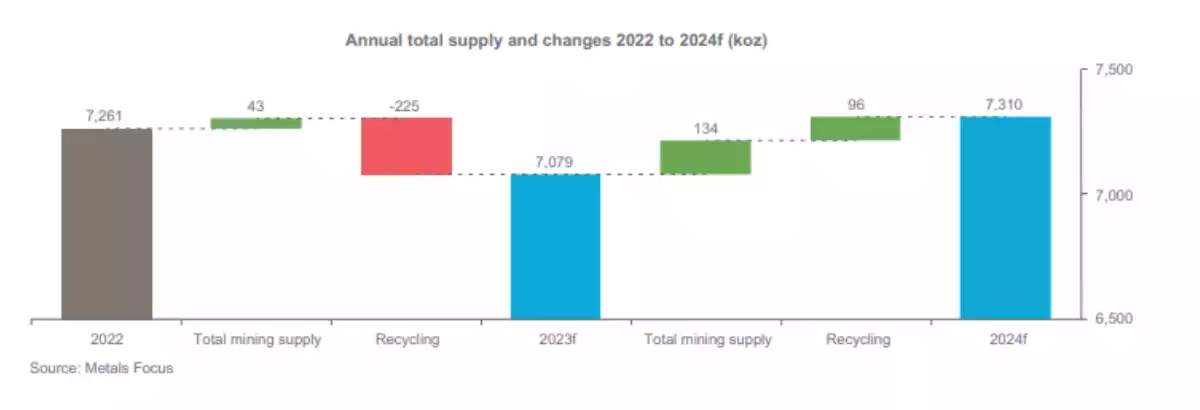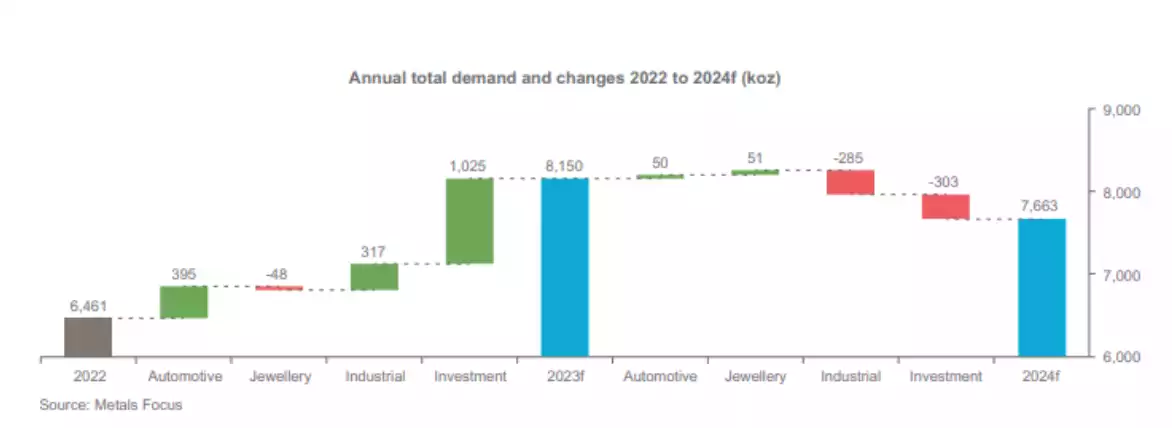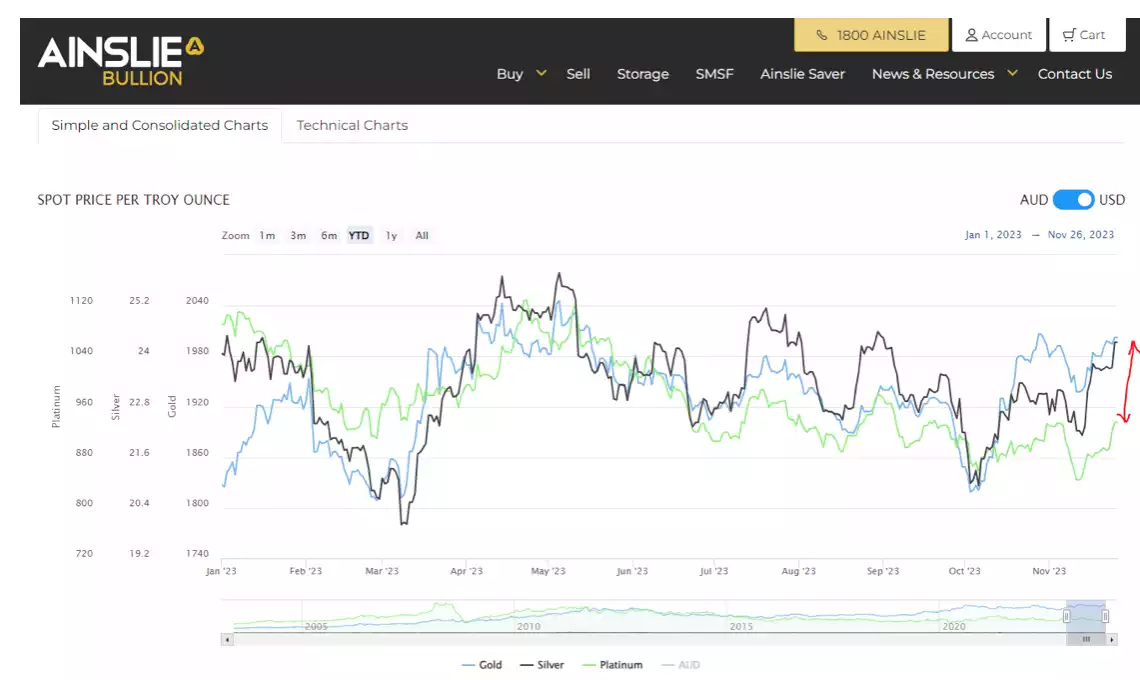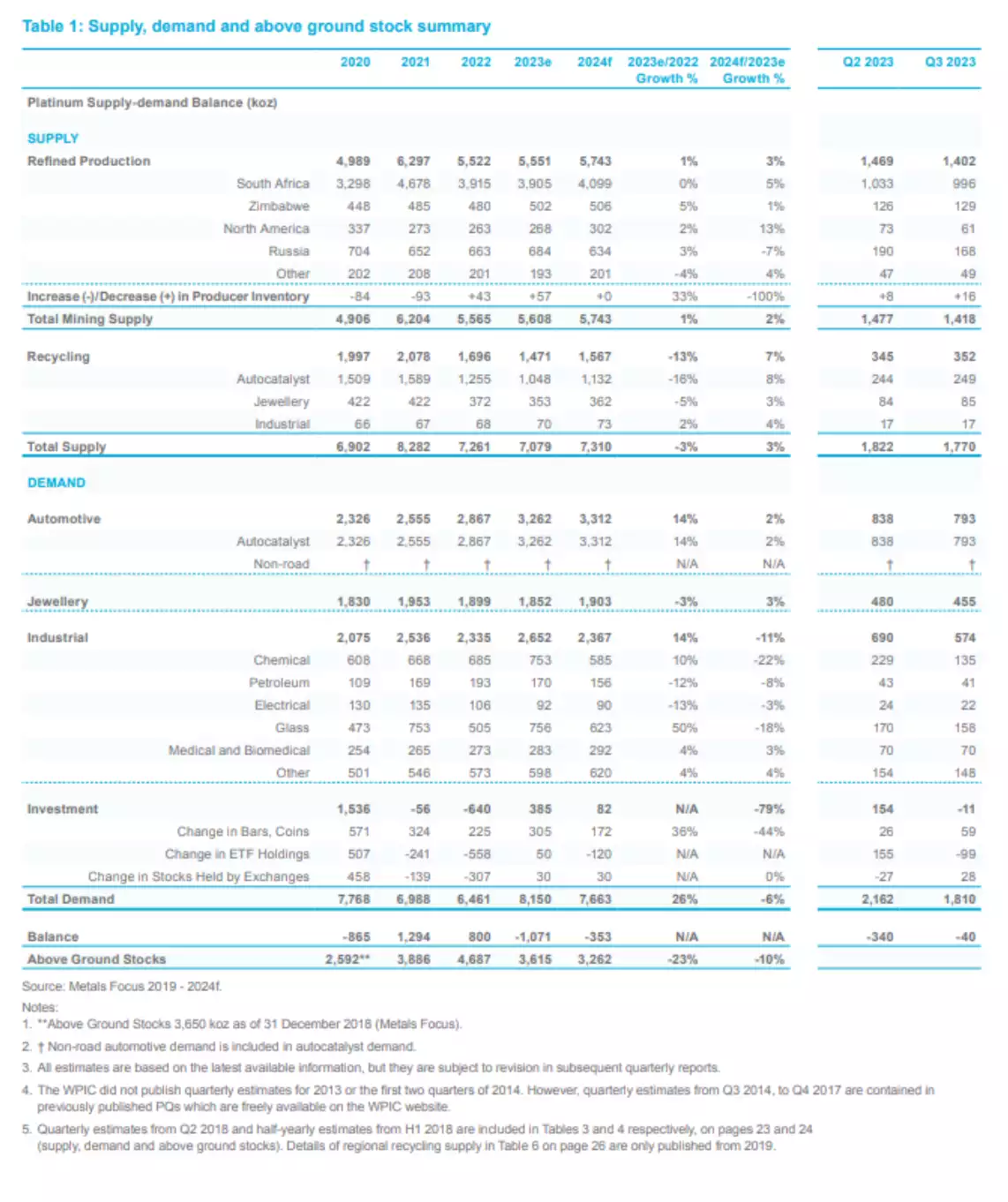World Platinum Investment Council Quarterly Report
News
|
Posted 27/11/2023
|
2083
Last week saw the release of the latest quarterly update from the WPIC and also an update on their 2023 estimates. For followers of platinum it will be music to your ears with the already record deficit blowing out even further. Here are the headlines and then deeper dive:
- Platinum deficit of 353 koz forecast for 2024, with this year’s estimated deficit to reach a record 1,071 koz
- Both mining and recycling supply expected to be well below pre-COVID levels in 2023 and 2024
- Automotive demand continues to strengthen, up 14% this year, with a further 2% increase expected next year
- 2023 will see the highest industrial demand on record, with 2024 the third-highest
- Investment demand forecast to remain positive in 2024
Supply constraints in mining and recycling persist
Global mine supply for full-year 2023 is expected to be essentially flat year-on-year at 5,608 koz, remaining around 8% below the 5-year pre-COVID average production level. For 2024, global platinum mine supply is forecast to grow by 3% year-on-year to 5,743 koz, with a 5% improvement in South African output expected.
The global platinum recycling estimate for 2023 has been further downgraded to 1,471 koz. Headwinds are expected to continue in 2024, meaning global recycling of platinum is expected to see only a modest improvement in 2024, increasing by 7%.

Demand

Automotive demand set to increase for fourth consecutive year in 2024
In 2023, automotive platinum demand is expected to jump by 14% to a six-year high of 3,262 koz, driven by an increase in vehicle production, stricter emissions regulations, particularly in China, and ongoing platinum-for-palladium substitution which will reach around 620 koz this year, against 385 koz in 2022.
Growth is also anticipated in 2024, with automotive demand projected to rise by 2% year-on-year to 3,312 koz, its highest level since 2016. Tighter emissions legislation, along with a forecast increase in platinum-for-palladium substitution to around 700 koz, will drive continued growth across most regions.
Record industrial demand in 2023, followed by third highest year in 2024
Industrial demand for 2023 is predicted to surge by 14% year-on-year reaching 2,652 koz – marking the strongest year on record. This growth has been propelled by significant capacity expansions in the glass sector and the chemical sector which offset lower demand from the electrical and petroleum markets.
While industrial demand is forecast to fall 11% in 2024 due to fewer capacity additions, it will nevertheless be the third-highest level on record at 2,367 koz.
Platinum jewellery demand remains unchanged
Global jewellery demand in 2023 is anticipated to decline by 3% from the previous year to 1,852 koz, with increases in India and North America failing to counteract weakness elsewhere, especially in China. For 2024, demand is expected to increase by 3% to 1,903 koz, with gains in China and India expected to be offset by a weaker North American market.
Second consecutive year of positive net investment
Global retail investment in platinum is anticipated to climb by 36% to 305 koz in 2023, primarily driven by a positive turnaround in Japan after three years of net disinvestment. ETF holdings experienced inflows for the first nine months of the year amid South African power supply concerns. However, with anticipated outflows in the final quarter, annual holdings will level out to a modest 50 koz gain. Net investment for the full year is expected to be 385 koz.
Bar and coin investment for 2024 is projected to fall by 44% to 172 koz, with demand in North America decreasing by 11% and Japan returning to net disinvestment. Platinum ETFs are expected to see an outflow of 120 koz next year, affected by high interest rates in Europe and North America. Meanwhile, forecast inflows to exchange warehouses stand at 30 koz. The result will mean net positive investment of 82 koz for the year.
For what it’s worth, we question the ‘high interest rates next year, drag on metals’ narrative repeated above. Historically higher rates have indeed been a drag on precious metals given the carry cost. However this year we have seen the market ‘look through’ that to the record high pile of debt that needs to be serviced at those rates and the danger and economic drag this presents to the market. That is why gold and silver have held strong and indeed gold considerably higher this year to date. If you missed it, Friday saw our latest Global Liquidity Index update which shows very clearly 2024 is likely to be a year of looser not tighter monetary policy. It’s a must read/watch if you missed it.
As you can see below using our excellent chart tool combining all metals, platinum is lagging the other 2 so far this year despite the above fundamentals. One cant help but wonder how long that can remain….

Total Detailed Summary
